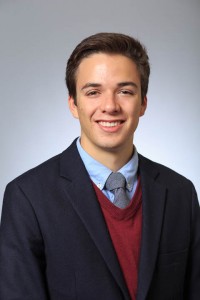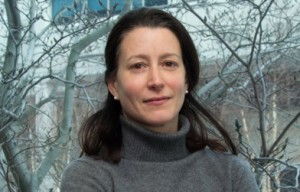
Gabrielle Rabadam, University Scholar
by Gabrielle Rabadam, COE & University Scholar, '19
On Thursday, I had the pleasure of not only meeting with Professor Maulsby over dinner but being seated right next to her. One of the most particularly memorable things she mentioned was how she herself has never had any desire to design her own building. This stuck with me because at first it seemed odd that an architecture professor had no aspirations to make her mark on the public spaces that she so loved analyzing. However, as the conversation went on, she explained how she never felt that it was her place to make such a contribution; she's content with her work consisting in explicating the nuances of others' work. I plan on carrying this insight with me throughout my career.

Ryan Maia, University Scholar
By Ryan Maia, CSSH & University Scholar, '19
Going into Prof. Maulsby's seminar about fascist architecture in Milan, I had never really thought deeply about architecture. Sure, I had thought the history behind buildings was fascinating, and I appreciated beautiful and intriguing architecture as much as the next guy, but I had never thought about how important architecture really is. Because, as Prof. Maulsby's seminar illustrated, architecture is critical in understanding our society.
It is evident enough how architecture relates to history; the common eye can typically distinguish between buildings that are “old” or “new.” But a facet of architecture's historical relevance which I had never before considered is the utilization of buildings as a means of rhetoric. For instance, Prof. Maulsby cited Mussolini's fascist party's acquisition of bourgeois, classically-designed buildings to headquarter in as a means of arguing the party's permanence and maturity. Similarly, Maulsby noted the persuasive power of the party's towering, omnipresent complexes as a means of both asserting a dominion over Milan's population and ensuring an open (albeit one way) platform of communication between the party and the people. I have always been enthralled by rhetoric, and Prof. Maulsby's talk has given me an entirely new scope of rhetoric to analyze. Even better, all I need to do to analyze this new rhetorical scope is walk out the door and look at the buildings around me.
I could certainly continue explicating my newly awakened architectural outlook, explaining my thoughts on how buildings can be a means of piecing together society's

Professor Lucy Maulsby
collective stream of consciousness and the implications of such. However, this commentary is already lengthier than what was asked of me, and it may also be wise to leave some content for potential future
writings. If I have not made it clear, Prof. Maulsby's seminar regarding fascist architecture in Milan was a hugely enlightening talk. I look forward to implementing and developing the architecture analyzing abilities the seminar seemed to have fostered within me. At the very least, I will never look at the Boston the same.
